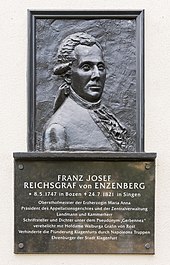Franz Josef von Enzenberg
Franz Joseph Reichsgraf von Enzenberg zum Freyen- and Jöchelsthurn (born May 8, 1747 in Bozen , † July 24, 1821 Singen am Hohentwiel ) was an Austrian lawyer and mineralogist .

Characteristic
He was the chief steward of the Archduchess Maria Anna of Austria , who moved from Vienna to Carinthia in April 1781 . As such, he was responsible for the princess's small court, the housekeeping, the ceremonies and the festivities in her Klagenfurt palace . After the Habsburg's death on November 19, 1789, the Count remained as President of the Court of Appeal in Klagenfurt , where he lived in the Viktringerhof . When Carinthia fell into enemy hands in the First Coalition War against France in 1797, the governor fledand left the population to their fate. In order not to hand them over to the French without protection, Enzenberg took over the representation of the governor. Above all, the Klagenfurters gave him credit for that. His monument at the portal of the country house was not erected until 73 years after his death.

biography
Enzenberg was born in Bolzano in 1747 into the counts of the Enzenberg family and was sponsored by the ruling Austrian Archduchess Maria Theresa and her husband, Emperor Franz I Stephan . The Empress treated the boy like a biological son. At eight he came to the Theresianum in Vienna, and at 19 he was sworn in as a real chamberlain. Now the young count started the traditional “Cavalier Tour” through the empire and half of Europe. From 1772 - in that year he was 25 - he worked as a councilor in Innsbruck , ie he held a government office. In 1781 he was appointed chief steward of the eldest daughter of Empress Maria Theresa, who had died the year before. He packed his suitcase and moved his residence to Klagenfurt , where a modest palace for the Habsburg woman had already been built in the Völkermarkt suburb in the 1970s . The Archduchess knew both the Count and his wife, as she had been a lady in waiting for Maria Theresa until she was married. Maria Anna valued Enzenberg, who was a Freemason in the Klagenfurt Lodge to the benevolent Marianna and a son of the Enlightenment , as a humanist of rank. Enzenberg's interests were mainly in mineralogy , botany and physical apparatus. The princess was 43 years old in 1781, her Obersthofmeister became 34. Enzenberg presided over the court with a sensitive hand. He created the prerequisites for fulfilled and happy years and made sure that the Habsburgs did not neglect their joy in this world and that the pious lady did not devote herself too much to her religious devotions and to the monastic life of the neighboring Elizabethines. Enzenberg succeeded in making the residence a center of intellectual and cultural life in Klagenfurt. After the death of the princess in the late autumn of 1789 and the dissolution of the residence, the now 43-year-old count had to find another service assignment. He was initially appointed President of the newly established Court of Appeal in Innsbruck and, in 1791, President of the same judicial authority in Klagenfurt. He then held this post until 1821. Only from 1803 to 1806 was he president of the appeal court in Venice .
During the first French invasion in the spring of 1797, Enzenberg showed particular courage: he stepped into the breach for the governor who had fled and made himself an advocate for the oppressed population. Even Bonaparte knew how to reward that, because he eased part of the war tax and, on the occasion of his short stay in Klagenfurt, appointed Enzenberg as chairman of a ten-person commission for the administration of the occupied country. A little anecdote has come down to us from these days . It was said that the victorious general had come to Enzenberg without taking off his headgear, whereupon he called for the valet and asked him to bring his hat immediately so that he would not have to face the French bareheaded. The general was 28 at the time, the count 50.
In 1821 the count celebrated his 50th anniversary with the company. After the celebrations, he retired to his wife's ancestral palace in Singen am Hohentwiel in southern Baden, where he died unexpectedly on July 24 at the age of 74. In 1789 he was elected a member of the Leopoldina . As the owner of the Grand Crosses of the Order of St. Stephen and Leopold , he was among the group of people with the highest awards.
Authorship
- Funeral speech for the serene Archduchess Maria Anna KH Read d. 19th winter month 1790. Walliser publisher 1790
literature
- Constantin von Wurzbach : Enzenberg, Franz Joseph Graf . In: Biographisches Lexikon des Kaiserthums Oesterreich . 24th part. Kaiserlich-Königliche Hof- und Staatsdruckerei, Vienna 1872, p. 404 ( digitized version ).
- Carinthia No. 7/1872
- Franz Josef von Enzenberg. In: Austrian Biographical Lexicon 1815–1950 (ÖBL). Volume 1, Publishing House of the Austrian Academy of Sciences, Vienna 1957, p. 255 f. (Direct links on p. 255 , p. 256 ).
- Carinthia I, 184th vol ./1994, p. 376
Individual evidence
- ↑ Rudolf Ćefarin: Carinthia and Freemasonry. A cultural-historical study. Saturn Verlag, Vienna 1932, p. 85
- ^ List of members Leopoldina, Franz von Enzenberg zum Freyen
| personal data | |
|---|---|
| SURNAME | Enzenberg, Franz Josef von |
| ALTERNATIVE NAMES | Enzenberg zum Freyen- and Jöchelsthurn, Franz Joseph Graf von |
| BRIEF DESCRIPTION | Austrian administrative lawyer and numismatist |
| DATE OF BIRTH | May 8, 1747 |
| PLACE OF BIRTH | Bolzano |
| DATE OF DEATH | July 24, 1821 |
| Place of death | Singing (Swabia) |
